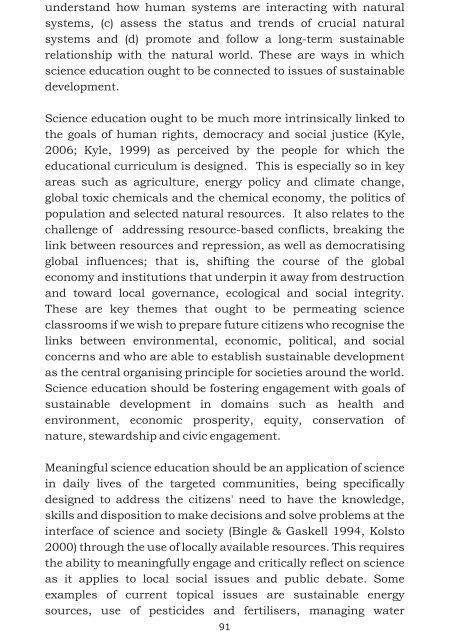Beneficiaries are actors too.pdf - Southern Institute of Peace ...
Beneficiaries are actors too.pdf - Southern Institute of Peace ...
Beneficiaries are actors too.pdf - Southern Institute of Peace ...
You also want an ePaper? Increase the reach of your titles
YUMPU automatically turns print PDFs into web optimized ePapers that Google loves.
understand how human systems <strong>are</strong> interacting with natural<br />
systems, (c) assess the status and trends <strong>of</strong> crucial natural<br />
systems and (d) promote and follow a long-term sustainable<br />
relationship with the natural world. These <strong>are</strong> ways in which<br />
science education ought to be connected to issues <strong>of</strong> sustainable<br />
development.<br />
Science education ought to be much more intrinsically linked to<br />
the goals <strong>of</strong> human rights, democracy and social justice (Kyle,<br />
2006; Kyle, 1999) as perceived by the people for which the<br />
educational curriculum is designed. This is especially so in key<br />
<strong>are</strong>as such as agriculture, energy policy and climate change,<br />
global toxic chemicals and the chemical economy, the politics <strong>of</strong><br />
population and selected natural resources. It also relates to the<br />
challenge <strong>of</strong> addressing resource-based conflicts, breaking the<br />
link between resources and repression, as well as democratising<br />
global influences; that is, shifting the course <strong>of</strong> the global<br />
economy and institutions that underpin it away from destruction<br />
and toward local governance, ecological and social integrity.<br />
These <strong>are</strong> key themes that ought to be permeating science<br />
classrooms if we wish to prep<strong>are</strong> future citizens who recognise the<br />
links between environmental, economic, political, and social<br />
concerns and who <strong>are</strong> able to establish sustainable development<br />
as the central organising principle for societies around the world.<br />
Science education should be fostering engagement with goals <strong>of</strong><br />
sustainable development in domains such as health and<br />
environment, economic prosperity, equity, conservation <strong>of</strong><br />
nature, stewardship and civic engagement.<br />
Meaningful science education should be an application <strong>of</strong> science<br />
in daily lives <strong>of</strong> the targeted communities, being specifically<br />
designed to address the citizens' need to have the knowledge,<br />
skills and disposition to make decisions and solve problems at the<br />
interface <strong>of</strong> science and society (Bingle & Gaskell 1994, Kolsto<br />
2000) through the use <strong>of</strong> locally available resources. This requires<br />
the ability to meaningfully engage and critically reflect on science<br />
as it applies to local social issues and public debate. Some<br />
examples <strong>of</strong> current topical issues <strong>are</strong> sustainable energy<br />
sources, use <strong>of</strong> pesticides and fertilisers, managing water<br />
91


